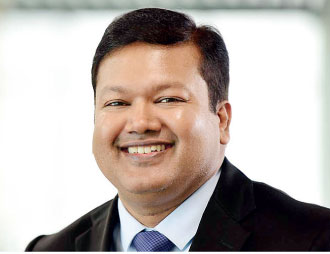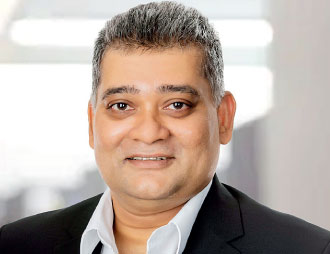Friday Feb 20, 2026
Friday Feb 20, 2026
Monday, 20 November 2023 00:00 - - {{hitsCtrl.values.hits}}
Deloitte South Asia Chief Executive Officer Romal Shetty is visiting Sri Lanka today to meet some of the prominent business leaders, other stakeholders, and Deloitte professionals in the country. Ahead of his visit, Shetty and Sri Lanka and Maldives Country Managing Partner Channa Manoharan share key insights to the organisation’s strategy going forward, the state of the Sri Lankan economy and business sentiments. Here are the excerpts from the interview.
 |
| Deloitte South Asia Chief Executive Officer Romal Shetty |
 |
| Sri Lanka and Maldives Country Managing Partner Channa Manoharan
|
Q: Deloitte has been in the news over the past weeks; you announced a new leadership team in Sri Lanka and Maldives bringing together leaders and experts and scaling up your business here. What was the strategy behind this move?
Romal: From a futuristic perspective, I do believe that this is South Asia’s decade. Three primary factors drive this confidence: First, the region boasts of a demographic dividend with the world’s largest human capital and a young population. Secondly, there is an opportunity to transform the economies in the region, including force multiplying trade among South Asian countries. And finally, we can leverage technology to overcome challenges and help build organisations of the future.
Sri Lanka’s role in this transformative journey will be essential. As the country prepares to take the next big leap, it has the potential to become the talent magnet that not only serves local clients but also contributes to large-scale global projects. We at Deloitte, in collaboration with the government, can work as a catalyst to accelerate the country’s economic resurgence, and our collective might, size, scale, and expertise can help make Sri Lankan companies the best in class.
The past few months and weeks have been one of the most exciting moments for us in Deloitte South Asia. This is one of the largest combinations in the history of professional services in the region, and our formidable presence in Sri Lanka and Maldives is now 28 Partners and nearly 1,000 professionals strong.
I am confident that our recently appointed leaders, Channa and Gerard, along with our partners and professionals, will help steer our ongoing growth and success in the country. I can’t wait to see the positive impact they will have on our organisation as we move forward together.
Q: Deloitte is the world’s largest professional services firm. With the success of this combination, how do you plan to build further? What is your strategy and plans going forward for Deloitte in Sri Lanka?
Romal: Our aim in Sri Lanka and across our South Asia region is to become the undisputed leader in professional services, distinguished by our quality, brand, well-being of our people, and scale. We believe we are well on the path to that goal. The combination was the first of the many investments we will be making in the South Asia region.
Further, significant investments will be made by infusing technology in everything we do – in all our practices. This will help us to become that first port of call for our clients with offerings across the spectrum of their needs – investor confidence, business transformation, building businesses, amongst others.
Channa: Our goal is to establish the same position of eminence in Sri Lanka that Deloitte has globally. Leveraging on the Deloitte skill sets available globally, we can use our own talents and harness those across the world to bring the best to local clients. Across all our service offerings we want to create conversations and initiate new thoughts and bring in solutions that will make a meaningful difference to our business community and our people.
One of the remarkable features of the Sri Lankan talent is the impact they’ve made internationally. We believe it is time to replicate this success exponentially within the local corporate environment. We anticipate Sri Lankan professionals, in every field, creating a similar difference locally. This not only enriches the corporate landscape but also ensures that the young workforce receives a comparable experience to that of working for a truly global firm, fostering an environment conducive to their growth. The objective is to create a momentum that not only helps individuals advance in their careers but also encourages them to remain committed to their professional journey.
Q: You mentioned earlier that this was the right time to be in Sri Lanka. How do you assess the state of the economy and your outlook for the country?
Romal: We are bullish about the growth prospects of the country.
We see the Sri Lankan Government embarking on a bold reformation agenda, and the private sector too is gearing up for growth. We want to be a positive force to support this process from both a private and government sector perspective.
Our talented youth, together with the strategic adoption of technology, will lead to transformation and help the Sri Lankan businesses and communities achieve their aspirations. This will also unlock a wealth of exciting new business opportunities in the region.
Globally, uncertainties exist due to geopolitical tensions, and in a globalised world, economies worldwide are not immune to these challenges. However, it is also true that the world is tilting towards Asia, more so South Asia, and every economy here has the opportunity to grow and succeed.
Channa: I agree, we are highly optimistic about Sri Lanka’s economic prospects.
The key factors in policy making at present, involve maintaining competitiveness and embracing a robust reform process. The country must continue its efforts in education, labour, tax, ease of doing business and land reforms, aligning ourselves closely with the other competitive economies of this region. We encourage the private sector to assume a more assertive stance. The private sector should be bold in seizing opportunities arising from reforms, particularly in sectors like infrastructure, technology, and renewable energy. We must serve as a driving force propelling these changes forward. We have to welcome the challenge to build globally competitive businesses rather than seeking to protect a small domestic market.
The fiscal targets are achievable if the government takes meaningful measures to enhance revenue, manage expenditure effectively and enhance efficiency. Investing in human capital is crucial for long-term growth. Consistency in economic policies, regardless of the political party in charge, is essential for stability and sustained growth.
We welcome the Budget proposals to invest in education and digitization. These will address some of our long felt needs to build a broader skill base quickly and bring in private sector and foreign participation to enhance our own expertise. Technology and skill transfer will lead to significant upgrading of local skills and this can be supplemented by labour mobility for selected industries. Digitisation will drive more economic activity, transparency and efficiency in providing citizens services. These measures are imperative for a modern society which seeks to enhance the quality of life of its citizens and ensure greater transparency and accountability by state institutions.
Q: In many ways organisations like Deloitte have a collective view of the business sentiments, the challenges they deal with and the opportunities to grow and thrive? What are the current conversations with businesses in Sri Lanka and your views on how they could scale?
Channa: Sri Lankan businesses now need to begin looking outward because when we want to scale up; a market of 20 million people is comparatively quite small when your aspiration is to be globally competitive. As such, our boardroom conversations today focus on enhancing competitiveness, embracing technology, upskilling the workforce, getting access to capital and building strong sustainable businesses capable of competing anywhere in the world.
The first step towards this takes place at the national and policy level where deregulated markets will enable firms to compete on merit. Thereafter at the corporate level they need to embrace the changes we spoke of earlier. At the individual level we believe that our workforce has the talent to compete anywhere in the world. But we need to ensure that we produce larger numbers of skilled people to fuel growth and invest in higher education in particular and teaching relevant skills to our youth.
Romal: I would agree with Channa. For any economy to scale, there are four fundamental aspects to be considered: the ability to have a product or service that is unique and not easily replicated, the infusion of technology, especially disruptive technology such as AI, to leapfrog and build at scale, skilling people and fostering a culture that embraces change and innovation to stay competitive, and finally having access to credit to power private investment. If businesses within Sri Lanka can build their next growth phase on some of these principles, there is no reason why more world-class organisations can’t emanate from this beautiful country.
Further, Sri Lanka holds the promising potential to emerge as a maritime hub and a pivotal logistics centre, encompassing both air and sea transportation. Despite its relatively small size, the nation boasts natural advantages, including a thriving tourism industry and renowned exports such as tea and spices. Leveraging these assets, Sri Lanka can fortify its position as a strategic hub for trade and commerce. Moreover, Sri Lanka’s high-quality education and healthcare systems translate to a skilled and capable workforce excelling in various sectors, from services to manufacturing.
Q: Romal you are one of the youngest CEOs in the professional services space. What has been your success mantra and also what advice would you give to young entrepreneurs and young professionals?
Romal: Over the years, I have had great role models and mentors who taught me that collaboration and rallying people to a common cause, with purpose at the heart of it, is the fulcrum of success. I believe leadership is having a vision that seems to be a real stretch, and then backing your team, caring for your team, and executing your strategy, relentlessly, to achieve the impossible. What has helped me further along the course is learning that leadership is about building a team that has better skills, capabilities, and aptitude than me.
My advice, therefore, is really around the experiences that have helped me shape my philosophy. 1) Learn to be comfortable while being uncomfortable in a very complex, ambiguous and volatile world, 2) find the true meaning and purpose behind your goals and objectives, and 3) understand and acknowledge that failure is nothing but a lesson and a pathway to success.